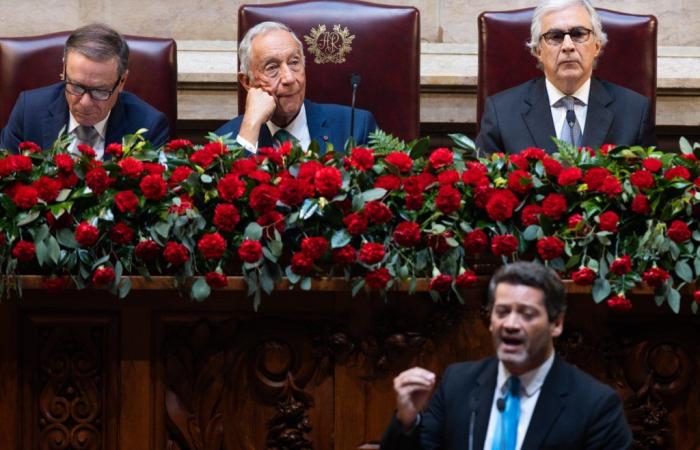In the interventions of the most left-wing parties, a dominant note was the tribute to those who overthrew the dictatorship of the Estado Novo, with a special and much applauded mention from the secretary general of the PS, Pedro Nuno Santos, to the captains of April, present in the galleries of the Assembly of Republic. But also praise for achievements, the desire to deepen democracy and warnings about the threats that this regime faces.
Pedro Nuno Santos admitted that the “realization of April’s dreams is an imperfect and unfinished work”, criticizing “unfair fiscal policies that relieve those who have the most and need the least”, while at the same time taking resources from the State.
And he did not forget the “enormous challenge” of welcoming the necessary immigrants to Portugal, refuting the expression “with wide open doors”, used by the current prime minister in the electoral campaign, without forgetting the need to consolidate the rights and freedoms of women and minorities sexual. “April does not prohibit any type of family,” he said, receiving much applause from his bench.
For her part, the coordinator of the Bloco de Esquerda, Mariana Mortágua, addressed the “mourners of Salazar”, considering that “the nostalgic people are dangerous” for blaming the revolution carried out half a century ago on phenomena such as poverty or corruption.
But in addition to seeing the Estado Novo as a regime characterized “by sadness, forced emigration, the damned war and the secondaryization of women”, it took aim at capitalism as a form of oppression and the creation of inequalities.
Before her, the general secretary of the PCP, Paulo Raimundo, defended that the need remains to “put an end to the cycle of right-wing policies”, followed by the parties that have divided governance over the last decades, anticipating that the “day of dream and fulfillment” will still be fulfilled.
Before him, Livre’s spokesperson, Rui Tavares, presented the 25th of April 1974 as “the most beautiful of dates” in the History of Portugal, as well as “the most beautiful revolution of the 20th century”, which inspired a wave of democratization in countries in Southern Europe and Latin America, while PAN spokesperson Inês de Sousa Real, who was the first to intervene, warned of the way in which “conquered rights are being called into question” by the rise of populist political forces that he considers to be contrary to human rights, and in particular the rights of women and animals, as well as environmental protection.
As for Ana Gabriela Cabilhas, who had the distinction of being the only speaker – with the exception of Paulo Núncio – who is not a party leader, the intervention of the deputy from the PSD parliamentary group was admittedly aimed at “a future of dreams and possibilities”, preferring “more than praise for the past, commitments to the future”.
But he also reserved some attention to Chega, without mentioning him, when arguing that the Assembly of the Republic must “realize the legitimate aspirations of the Portuguese, refusing to allow extremists to radicalize society by dividing it between politicians and the people”.
Penultimate to speak, in a session that officially ended with the national anthem, but was prolonged with “Grândola, Vila Morena”, sung by the guests present in the galleries and by many deputies, while others, namely from Chega, left the hemicycle, hearing some shouts of “fascists will not pass”, the president of the Assembly of the Republic will have made the most conciliatory intervention of the morning.
In the opinion of José Pedro Aguiar-Branco, in the face of “so much radicalization, polarization and populism”, it is not permissible to “blame the Portuguese for their choices at the polls”, especially because “the disillusionment of some is fought with good governance and not with words and more or less inflammatory speeches”, in an implicit criticism of the actions of his predecessors Ferro Rodrigues and Augusto Santos Silva towards André Ventura’s party.
Lusophone leaders demand April
At the end of the afternoon, in a commemorative session at the Centro Cultural de Belém, in which Marcelo Rebelo de Sousa joined his counterparts from all the countries of the Community of Portuguese Speaking Countries, with the exception of Brazil, there was no talk of reparations either, but the Claiming the role of liberation movements in the fall of the Estado Novo was a dominant note in the interventions.
The President of Angola, João Lourenço, began by highlighting that the “historic event” celebrated yesterday put an end to decades of Estado Novo, not only for the Portuguese, but also for the then colonies. “While the Portuguese people have fought against the fascist dictatorship since 1932, we have been fighting against Portuguese colonization since the 15th century,” said the Angolan statesman, referring to slavery and looting as consequences of colonial rule.
But João Lourenço also immediately established the influence of liberation movements on the outbreak of April 25, 1974, relating historical facts such as the unilateral proclamation of independence of Guinea-Bissau, in the year before the fall of the Marcello Caetano regime, or the “Operation Górdio Knot fiasco”, by which the Portuguese army sought to defeat Frelimo in the Cabo Delgado region, in northern Mozambique. Saying that these were events “that precipitated the military coup in Lisbon”, the President of Angola declared that the cause of the people of the former colonies “was the same as that of the Portuguese people”.
Umaro Sissoco Embaló, President of Guinea-Bissau, also said that “it was not surprising the strategic convergence between the fighters against colonialism and those who fought the dictatorship”, even though his country’s independence was only recognized by Portugal on the 27th. of July, three months after the Carnation Revolution, by the then President of the Republic, António de Spínola. “The Guinean people are proud to have made this original contribution”, he said, pointing out the recognition of Guinea-Bissau’s unilateral independence by “a large majority of member countries of the United Nations”, as well as the PAIGC’s military superiority on the ground , as factors that contributed to accelerating the Captains’ Movement.
The President of Mozambique, Filipe Jacinto Nyusi, who treated Marcelo Rebelo de Sousa as a “dear brother” – and assured that he would be present at the celebrations of the 50th anniversary of the 25th of April “even if he didn’t invite me” – also related the fall of the State I hate the “advancement of the anti-colonialist struggle”, regretting that the Portuguese people and the African people “have cried for the blood shed by their best”.
Referring directly to Operation Nó Górdio, led by General Kaulza de Arriaga, in which the Lisbon regime used all its military force, Nyusi said it symbolized the “failure of the fascist dictatorial regime” and made “the urgency of the end of the colonial wars in Africa”.
But the Mozambican statesman also mentioned massacres of the civilian population such as the one that happened in Wiriyamu, considering them “inexcusable”, as “they dishonor our History and deserve condemnation by all who respect human life”. In this regard, he argued that “it is time to face historical facts responsibly”, but without bringing the issue of financial reparations to the ceremony.
For the President of São Tomé and Príncipe, Carlos Manuel Vila Nova, the freedom achieved by the Portuguese 50 years ago is “tributable, to a large extent, to the struggle of the liberation movements”, as they have caused the Portuguese military to have “it aroused the feeling that the war they were fighting made no sense at all”. On the other hand, he lamented the “moment of colonial stubbornness, which made the process of emancipation cruel and violent”. For the African people, and for the “numerous families who experienced mourning” in Portugal.
At the ceremony, which was closed by Marcelo Rebelo de Sousa with a thank you for the “fraternal, supportive and rewarding” presence of his counterparts, there were also the Presidents of Cape Verde, José Maria Neves, and of Timor-Leste, Ramos-Horta.






